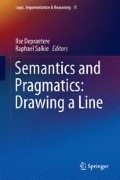Abstract
This paper discusses the relevance of experimental evidence to theoretical debates about the psychological plausibility of Grice’s theory of conversational implicature. Existing pragmatic theories, for example, Gricean pragmatics or relevance theory, are general frameworks for thinking about pragmatic phenomena, but, in general, they do not provide detailed models of specific utterance situations. This means that consistency or perceived inconsistency with experimental results provides only weak arguments for the debate between the different pragmatic schools. In particular, I argue that there exist no experimental studies that would pose serious problems for the Gricean account. With respect to the claim that psychological plausibility is the ultimate criterion by which pragmatic theories should be evaluated, I argue that a comprehensive pragmatic theory has to encompass a theory of cognitive processing as well as a theory that explains pragmatic behaviour in terms of rational interaction. I recommend a theory’s ability to predict pragmatic behaviour as a key criterion of success.
Access this chapter
Tax calculation will be finalised at checkout
Purchases are for personal use only
Notes
- 1.
This sketch leaves out a number of important details about Lewis’s definition of conventions (Lewis 1969, Sec. I.4).
References
Asher, N. (2013). Implicatures and discourse structure. Lingua, 132, 13–28.
Benz, A. (2012). Implicatures of complex sentences in error models. In A. Shalley (Ed.), Practical theories and empirical practice (pp. 273–306). Amsterdam: John Benjamins.
Benz, A., Jäger, G., & van Rooij, R. (Eds.) (2006). Game theory and pragmatics. Basingstoke: Palgrave Macmillan.
Benz, A., Ebert, C., Jäger, G., & van Rooij, R. (Eds.) (2011). Language, games, and evolution: Trends in current research on language and game theory (Lecture notes in artificial intelligence, Vol. 6207). Heidelberg: Springer.
Breheny, R., Katsos, N., & Williams, J. (2006) Are generalised scalar implicatures generated by default? An on-line investigation into the role of context in generating pragmatic inferences. Cognition, 100, 434–463.
Chierchia, G. (2004). Scalar implicatures, polarity phenomena, and the syntax/pragmatics interface. In A. Belletti (Ed.), Structures and beyond (pp. 39–103). Oxford: Oxford University Press.
Chierchia, G., Crain, S., Guasti, M. T., Gualmini, A., & Meroni, L. (2001). The acquisition of disjunction: Evidence for a grammatical view of scalar implicatures. In Proceedings of the 25th annual Boston university conference on language development (pp. 157–168).
Clark, H. H. (1996). Using language. Cambridge: Cambridge University Press.
Clark, R. (2012). Meaningful games: Exploring language with game theory. Cambridge: The MIT Press.
Franke, M. (2009). Signal to act: Game theory in pragmatics. PhD thesis, Universiteit van Amsterdam. ILLC Dissertation Series DS-2009-11.
Gazdar, G. (1979). Pragmatics: Implicature, presupposition, and logical form. New York: Academic Press.
Grice, H. P. (1989). Studies in the way of words. Cambridge: Harvard University Press.
Grodner, D., & Sedivy, J. C. (2004). The effect of speaker–specific information on pragmatic inferences. In N. J. Pearlmutter & E. Gibson (Eds.), The Processing and acquisition of reference (pp. 239–272). Cambridge: The MIT Press.
Grodner, D. J., Klein, N. M., Carbary, K. M., & Tanenhaus, M. K. (2010). “Some,” and possibly all, scalar inferences are not delayed: Evidence for immediate pragmatic enrichment. Cognition, 116(1), 42–55.
Horn, L. R. (1989). A natural history of negation. Chicago: University of Chicago Press.
Huang, Y. (2007). Pragmatics. Oxford: Oxford University Press.
Huang, Y. T., & Snedeker, J. (2009). Online interpretation of scalar quantifiers: Insight into the semantics–pragmatics interface. Cognitive Psychology, 58, 376–415.
Katsos, N., & Bishop, D. V. M. (2011). Pragmatic tolerance: Implications for the acquisition of informativeness and implicature. Cognition, 120(1), 67–81.
Levelt, W. J. M. (1989). Speaking: From intention to articulation. Cambridge: The MIT Press.
Levinson, S. C. (1983). Pragmatics. Cambridge: Cambridge University Press.
Levinson, S. C. (2000) Presumptive meanings: The theory of generalized conversational implicatures. Cambridge: MIT Press.
Levinson, S. C., Torreira, F. (2015) Timing in turn-taking and its implications for processing models of language. Frontiers in Psychology, 6(7), 731.
Lewis, D. (1969). Convention. Harvard: Harvard University Press.
Noveck, I. (2001). When children are more logical than adults: Investigations of scalar implicature. Cognition, 78(2), 165–188.
Papafragou, A., & Musolino, J. (2003). Scalar implicatures: Experiments at the semantics-pragmatics interface. Cognition, 86, 253–282.
Papafragou, A., & Tantalou, N. (2004). Children’s computation of implicatures. Language Acquisition, 12(1), 71–82.
Parikh, P. (2001). The use of language. Stanford: CSLI Publications.
Parikh, P. (2010). Language and equilibrium. Cambridge: The MIT Press.
Pavan, S. (2013). Quantity implicatures and iterated admissibility. Linguistics and Philosophy, 36, 261–290.
Recanati, F. (2004). Literal meaning. Cambridge: Cambridge University Press.
Sacks, H., Schegloff, E., Jefferson, G. (1974). A simplest systematics for the organization of turn-taking for conversation. Language, 50, 696–735.
Sauerland, U. (2004). Scalar implicatures in complex sentences. Linguistics and Philosophy, 27, 367–391.
Saul, J. (2002). What is said and psychological reality: Grice’s project and the relevance theorists’ criticisms. Linguistics and Philosophy, 25, 347–372.
Schiffer, S. R. (1972). Meaning. Oxford: Clarendon Press.
Sperber, D., Wilson, D. (1995). Relevance: Communication and cognition. Oxford: Blackwell Publishing.
Tomlinson, J., Bailey, T. M., & Bott, L. (2013). Possibly all of that and then some: Scalar implicatures are understood in two steps. Journal of Memory and Language, 69, 18–35.
von Neumann, J., & Morgenstern, O. (1944). Theory of games and economic behavior. Princeton: Princeton University Press.
Acknowledgements
This work was supported by Bundesministerium für Bildung und Forschung (BMBF) (Grant Nr. 01UG1411). I thank Gerhard Schaden for his insightful comments at ESSLLI 2014.
Author information
Authors and Affiliations
Corresponding author
Editor information
Editors and Affiliations
Rights and permissions
Copyright information
© 2017 Springer International Publishing Switzerland
About this chapter
Cite this chapter
Benz, A. (2017). Pragmatics Between Experiment and Rationality: Response to Chapman. In: Depraetere, I., Salkie, R. (eds) Semantics and Pragmatics: Drawing a Line. Logic, Argumentation & Reasoning, vol 11. Springer, Cham. https://doi.org/10.1007/978-3-319-32247-6_5
Download citation
DOI: https://doi.org/10.1007/978-3-319-32247-6_5
Published:
Publisher Name: Springer, Cham
Print ISBN: 978-3-319-32245-2
Online ISBN: 978-3-319-32247-6
eBook Packages: Religion and PhilosophyPhilosophy and Religion (R0)

